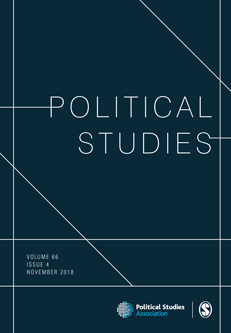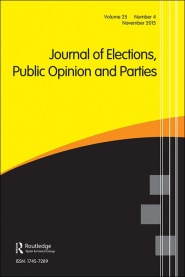Elections
2019 Canadian Federal Election – Forecasts for the Incumbent Party
THE CANADA ELECTION NOWCASTER ———————————————————————————- FINAL FORECAST FOR: OCTOBER 2019 (41.23%) ———————————————————————————– Post-election update: The 2019 election has proven to be quite harsh for the model, producing its second highest error (around eight percentage points) over the 1953-2019 period. Although I will look more deeply into this in the coming weeks, the SNC-Lavalin scandal and […] Read more

Public Opinion, Turnout and Social Policy
Abstract According to democratic theory, policy responsiveness is a key characteristic of democratic government: citizens’ preferences should affect policy outcomes. Empirically, however, the connection between public opinion and policy is not self-evident and is increasingly challenged. Using an originally constructed dataset with information from 21 OECD countries between 1980 and 2014, our research design allows […] Read more
Brève réflexion sur les résultats de l’élection québécoise de 2018 : deux victoires et une défaite et demie
par Philippe Mongrain À la veille de l’élection québécoise du 1er octobre 2018, la plupart des sondages et des projections laissaient croire à la formation d’un gouvernement caquiste ou libéral minoritaire (voir L’élection québécoise de 2018). Or, le parti de François Legault a rapidement distancé ses adversaires. Sur bien des plans, l’élection de 2018 […] Read more

Do Volatile Voters Vote Less Correctly?
Abstract The literature on electoral volatility and the literature on electoral campaigns hold contradictory views on voters switching vote (intention) during the campaign. In this note, we shed new light on this contradiction, making two contributions. First, we investigate the extent to which stable and volatile voters choose the correct party. Second, we distinguish […] Read more

The Effects of Survey Mode and Sampling in Belgian Election Studies
Abstract National probability election surveys are more and more abandoned. Decreasing response rates and the escalating costs of face-to-face and telephone interviews have strengthened election scholars’ reliance on non-probability internet samples to conduct election surveys online. In a number of countries, experiments with alternative ways of recruiting respondents and different interview modes have been well […] Read more
New research project: Elections as a Linkage Mechanism between Public Opinion and Policy Outcomes, a longitudinal and comparative analysis
The Social Sciences and Humanities Research Council (SSHRC) has announced the results of the February 2017 competition of its Insight Development Grants program. One of the funded research projects is a project on ‘Elections as a Linkage Mechanism between Public Opinion and Policy Outcomes’, that will be supervised by Ruth Dassonneville. Summary of the […] Read more